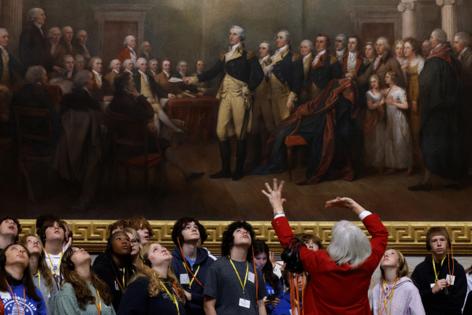LZ Granderson: Men like Trump represent what the founders were fighting against
Published in Op Eds
George Washington was quite the man.
Life handed him the keys to this brand-new country, and instead of clinging to the steering wheel until he drew his last breath, he pulled over and let someone else drive.
It was this peaceful transfer of power that made America exceptional — and Washington the defining figure of American masculinity. Even after the American Revolution, the dominant model for rule around the world was heredity. Kings begat kings, and power was passed down like grandpa's cottage in the woods. For centuries, rulers governed not because of proven character but by accidental birth.
And the founders hated it.
Read Thomas Paine's 250-year-old essay, "Common Sense," and you see few things bothered Colonial men more than servitude to geopolitical nepo-babies. It's evident in the writings and personal libraries of our earliest presidents, such as Thomas Jefferson. You can trace that sentiment all the way back to the Greek philosophers whom the founders studied before this nation began.
Their aversion wasn't to wealth and power. It was about what can happen to a person who grows up knowing nothing but wealth and power.
"Men who look upon themselves born to reign, and others to obey, soon grow insolent," Paine wrote in 1776. "Selected from the rest of mankind, their minds are early poisoned by importance; and the world they act in differs so materially from the world at large, that they have but little opportunity of knowing its true interests, and when they succeed to the government are frequently the most ignorant and unfit of any throughout the dominions."
In some ways Paine's summation is the original diagnosis for toxic masculinity. Inherited wealth and political power were considered traits that made men susceptible to corruption and weak-mindedness because of a lack of civic duty. Aristotle believed that without a sense of civic duty, concepts such as "virtue" and "concern for others" were hard for a person to grasp. Successors to a lot of that ancient Greek thinking, including Washington and Jefferson, defined manhood not by surrendering to individual impulse but by having mastery over them.
That's why, although the men who fought for freedom and founded this nation weren't perfect or above reproach, President Donald Trump should never be compared to them.
He was a millionaire by age 8; accused of (or personally bragged of) cheating on all three of his wives; and lived through five wars without serving in any of them. Judging from Paine's own words, men like Trump represent what this country was fighting against, not what men in America ought to be.
There have been no better examples of that than his recent actions.
First: When Catherine Lucey, a correspondent for Bloomberg News, asked Trump a question he didn't like, the most powerful man in the world pointed an angry finger at her and said, "Quiet, piggy." He presumably didn't like the question because it was tied to his administration's handling of the Jeffrey Epstein files. Each time that name is mentioned, voters are reminded that he and Epstein — a financier, convicted sex trafficker and pedophile— partied together for years. The House recently released a collection of emails related to Epstein that mention the president's name several times. In response, he ordered that his political rivals be investigated.
Second: When some Democratic lawmakers — including Sen. Elissa Slotkin, who served three tours in Iraq, and Sen. Mark Kelly, who was a Navy pilot in the first Gulf War — released a video urging U.S. troops to honor their oaths and refuse illegal orders, Trump said the words of the members of Congress were "punishable by death."
"Our laws are clear," the group said in the video. "No one has to carry out orders that violate the law or our Constitution."
The president called their message "SEDITIOUS BEHAVIOR" in a post online and shared another user's post that said "HANG THEM GEORGE WASHINGTON WOULD!!"
Hence the need to remind you what kind of man Washington was — or as we would say now, what kind of grownup.
The reason Trump reacted so vehemently to lawmakers reminding members of the military to follow the law is because "men who look upon themselves born to reign, and others to obey, soon grow insolent." When Paine wrote that 250 years ago, it resonated with people because they had witnessed it. They were living through it. That's why American masculinity was defined by the founders to be the antithesis of all of that.
Today we are having a cultural conversation about masculinity. Some misguided saps on a mic point the finger at women with careers as the reason men are struggling.
I say we're struggling because too many of us still view Trump's behavior and rhetoric as good examples. We've forgotten that the forefathers wanted civic duty — not impulsive insults and lawlessness — to be the hallmarks of American virtue. It wasn't Washington's use of military might that separated him — separated us — from the others — it was the power he showed in restraint.
____
_____
©2025 Los Angeles Times. Visit at latimes.com. Distributed by Tribune Content Agency, LLC.
























































Comments